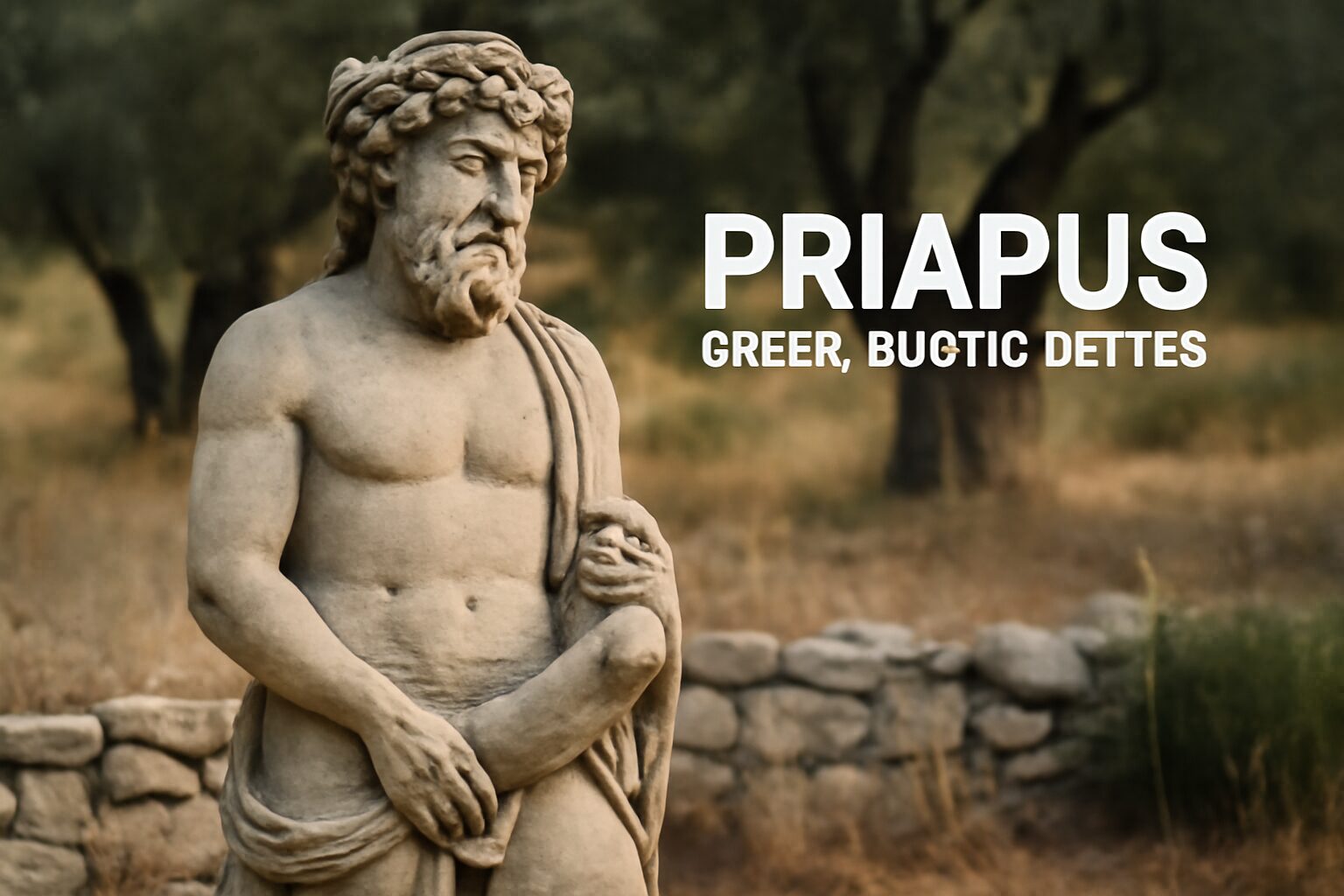Priapus: The Fertility God of Greek Mythology
In Greek mythology, Priapus is a rustic god of fertility, gardens, and male virility, often depicted with an exaggerated, permanent erection. Though not among the major Olympian deities, his presence was significant in agricultural and domestic settings, where he was believed to protect livestock, crops, and vineyards.
Origins and Family
Priapus was the son of Aphrodite, the goddess of love, and Dionysus, the god of wine—though some myths suggest his father was Hermes or even Zeus. His grotesque appearance, marked by his oversized phallus, was said to be the result of a curse from Hera, who was jealous of Aphrodite’s beauty and sought to punish her son. Despite his unusual form, Priapus was revered in rural communities as a guardian of fertility.
Role and Powers
Priapus was primarily a god of fertility and abundance, ensuring bountiful harvests and thriving livestock. His statues, often carved from wood or stone, were placed in gardens and orchards to ward off thieves and evil spirits. Farmers would make offerings to him to ensure their crops flourished. His most famous myth involves an attempted assault on the sleeping nymph Lotus, which was thwarted when a donkey brayed loudly, waking her and exposing his intentions.
Cultural Significance
Though not widely worshiped in grand temples, Priapus held a unique place in Greek and later Roman culture. His image was a common sight in rural areas, symbolizing both protection and fertility. The Romans adopted him enthusiastically, associating him with their own agricultural deities. Over time, his name became the root of the medical term priapism, referring to persistent and often painful erections.
Despite his comical and sometimes crude depictions, Priapus embodied the raw, unrefined forces of nature—reminding ancient Greeks of the earthy, primal aspects of life that even the loftiest gods could not ignore.
Alternative Names for Priapus
God Name: Mutinus Titinus (Roman)
Mutinus Titinus was a Roman deity associated with fertility and marriage, often identified with Priapus. The name reflects his role in ensuring marital fertility and the consummation of marriages.
God Name: Fascinus (Roman)
Fascinus was a Roman phallic deity, embodying the divine power of the phallus, similar to Priapus. The term also refers to amulets shaped like phalli, used for protection and fertility.
God Name: Orphic Priapus (Greek)
In Orphic traditions, Priapus was sometimes given a more mystical role, associated with the cycles of nature and the underworld, diverging slightly from his typical fertility symbolism.
God Name: Liber Pater (Greek/Roman Syncretism)
In some syncretic traditions, Priapus was equated with Liber Pater, a Roman god of fertility and wine, blending aspects of both deities into a single figure.
Tales about Priapus
Priapus and Dionysus: The Unwelcome Guest
At a grand feast hosted by Dionysus, god of wine and revelry, Priapus found himself among the illustrious guests. Overcome by wine and desire, he set his sights on the sleeping nymph Lotis. Under the cover of night, he crept toward her, but as he drew near, Silenus’s donkey brayed loudly, startling the entire gathering awake. Exposed and humiliated, Priapus fled the scene, earning the eternal mockery of the gods and solidifying his reputation as a figure of comical lust and folly.
Priapus and Hestia: The Chaste Rejection
During a tranquil gathering on Mount Olympus, Priapus attempted to approach the ever-virginal Hestia, goddess of the hearth. As he drew near with impure intentions, a donkey—the same one that had thwarted him before—let out a piercing cry. Hestia awoke instantly, and her pure presence repelled Priapus, who stumbled back in shame. This incident further emphasized the stark contrast between his unbridled desires and her sacred chastity, a moment immortalized in myth as a testament to his recurring humiliation.
Frequently Asked Questions
Who is Priapus in Greek mythology?
Priapus is a minor rustic god in Greek mythology, known as the god of fertility, gardens, and male genitalia. He is often depicted with an exaggerated phallus and was believed to bring protection and abundance to gardens and livestock.
Why is Priapus important in Greek mythology?
Priapus symbolizes fertility, agriculture, and the protective aspects of nature. His importance lies in his role as a guardian of gardens and livestock, ensuring prosperity and warding off evil spirits or thieves in rural communities.
What can we learn from the myths about Priapus?
The myths about Priapus highlight the ancient Greeks' connection to nature and their reliance on fertility for survival. His stories often blend humor with reverence, showing how they celebrated both the practical and symbolic aspects of life and growth.
How does Priapus relate to modern culture?
While not as widely recognized today, Priapus's symbolism of fertility and protection can still be seen in garden statues or art. His exaggerated imagery also influenced later cultural depictions of fertility and masculinity in various forms of media.
Was Priapus worshiped in ancient Greece?
Yes, Priapus was worshiped, particularly in rural areas where fertility and agriculture were vital. Small shrines or statues of him were placed in gardens or fields to invoke his blessings for abundant harvests and protection.













